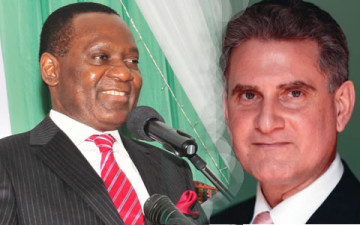Nigeria and the United Kingdom may be headed for a diplomatic showdown over the proposed policy by the British government requiring Nigerians intending to travel to the UK to deposit £3000 as bond in case they stay beyond the period their visa allows them to.
The Federal Government on Monday summoned the British High Commissioner to Nigeria, Dr. Andrew Pocock, to register its displeasure over the policy, while the House of Representatives which flayed the policy, argued that it could have negative impact on the relationship between the two countries.
Nigeria, Bangladesh, Sri Lanka, Ghana, Pakistan and India are listed by the UK as countries whose citizens are to deposit the £3,000 under the proposed policy that will take off in November, described the Home Office as “those with the most significant risk of abuse.”
About 2.2million people are granted visas to enter Britain every year.
Last year, 296,000 people from India were granted six-month visas, as were 101,000 from Nigeria; 53,000 from Pakistan; and 14,000 apiece from Bangladesh and Sri Lanka.
According to media reports, the Home Secretary Theresa May said the administration of British Prime Minister, David Cameron, is serious about cutting immigration and abuses of the system.
The Sunday Times of London had reported that every visitor aged 18 and above granted a six-month visa would forfeit the £3,000 if they overstayed in Britain after the expiration of their visa.
Initially, the scheme will target hundreds of visitors, but the plan is to extend it to several thousands, according to the broadsheet’s front-page report.
It was gathered that Pocock would meet with the Minister of Foreign Affairs, Ambassador Olugbenga Ashiru, on Tuesday (today) to explain the policy.
A source close to the ministry, who confirmed the meeting, said the government was seriously concerned about the implication of the policy on the economy and image of the country.
“Pocock is to explain to government if the plan is true and why Nigeria is a target. Government is worried about the highly discriminatory policy which tends to portray the country in a bad light,” he explained.
Another source told one of our correspondents that the Nigerian High Commissioner to the UK, Dr. Dalhatu Tafida, was also billed to brief Ashiru on the development.
But Ashiru, at the 2013 Ministerial Platform on the mid-term activities and achievements of the ministry in Abuja on Monday, said he had not been contacted officially by the UK authorities on the development.
He said, “We have not received any official communication from the UK government. When we receive communication, we will study the proposal. I can assure all Nigerians that President Goodluck Jonathan’s government will defend the interest of Nigerians by whatever means it can. When we get the proposal, we will study it to see how it will affect ordinary Nigerians.”
In the House of Representatives, Chairman, Committee on Foreign Affairs, Ms. Nnena Elendu-Ukeje, stated that the policy was a U-turn on a promise by the British Prime Minister, David Cameron, to improve trade relations between the two countries next year.
She said, “This policy will not foster true relationship between Nigeria and the UK. It does not promote the spirit of the Commonwealth either.
“The same British Government that promised improved trade relations with Nigeria is introducing such a discriminatory policy.
“It is a somersault, to say the least.”
However, Elendu-Ukeje observed that the policy appeared to be “a political issue.”
She explained, “The Conservative Party wants to prove that they are serious about immigration matters. They are doing this to win voters ahead of the next elections.”
But, she called on the Federal Government to take urgent steps to register its protest before the take-off date of the policy.
“We have to take proactive measures to oppose this policy and by way of reciprocity because next time they will increase this bond of a thing”, she said.
The lawmaker recalled that in 2008, the British Government introduced £1,000 “fine” on travellers.
“They tried it first in 2008; today, four years down the line, they are saying that it will be £3,000. What will be the next figure if we don’t take proactive measures now?” Elendu-Ukeje asked.
An expert in constitutional law, Prof. Itse Sagay, also described the policy as “ hostile and therefore contrary to international diplomacy.”
He said, “It is evidence of contempt and a clear case of saying ‘we don’t want people from their country and so let us make it impossible for them to come.
“How many people can pay N750,000 as deposit which the British Government will keep and probably trade with while the owner cannot touch it. I think we need to respond appropriately by also raising impossible barrier to British people coming into Nigeria so that at the end, we will see who will lose more.
“I think they are making the mistake of believing we need them more than they need us. In fact, it is they who are making more out of Nigeria.
“They have a wrong idea of their importance to us. We are more important to them than they are to us.”



Leave a Reply